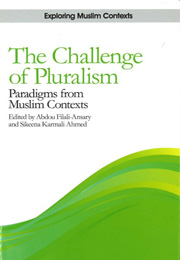Book contents
- Frontmatter
- Contents
- Introduction: Theoretical Approaches to Cultural Diversity
- PART ONE THE HERITAGE: HISTORICAL CONTEXTS
- PART TWO CONTEMPORARY THOUGHT
- 3 Civil Society and Conflict Management: Bangladesh's Experiences
- 4 Pluralism and Liberalism in Contemporary Islamic Thought
- 5 Democracy, Pluralism and Political Islam
- 6 Islam, Conflict and Democracy
- 7 The Diversity of Cultures in the Crucible of Globalisation
- About the Contributors
- Index
3 - Civil Society and Conflict Management: Bangladesh's Experiences
from PART TWO - CONTEMPORARY THOUGHT
Published online by Cambridge University Press: 12 September 2012
- Frontmatter
- Contents
- Introduction: Theoretical Approaches to Cultural Diversity
- PART ONE THE HERITAGE: HISTORICAL CONTEXTS
- PART TWO CONTEMPORARY THOUGHT
- 3 Civil Society and Conflict Management: Bangladesh's Experiences
- 4 Pluralism and Liberalism in Contemporary Islamic Thought
- 5 Democracy, Pluralism and Political Islam
- 6 Islam, Conflict and Democracy
- 7 The Diversity of Cultures in the Crucible of Globalisation
- About the Contributors
- Index
Summary
It is ironic that South Asia, the land of Gandhi, Tagore, Lalon, a land immersed in an ocean of civilisations, cultures and syncretism, today finds itself torn by politicised ethnicities and religions. Much of it, however, is a construct of “secular” politics, the ongoing militant politicisation of governance structures and ethos, and also the creation and re-creation of knowledge systems. It is therefore no surprise that conflict and security discourses have remained trapped within the language of insecurity and war. The periodisation that accompanied the formal onset of these discourses and disciplines since the end of the Second World War has been in terms of hot wars, Cold War or post-Cold War, with war remaining an important signifier. Subsequent attempts at peace-building, security studies, and conflict management not only had their genesis within a paradigm of insecurity, but were built on the premises of insecurity, mistrust and crisis or lack of confidence. In other words, they were immersed in a language that deployed terms such as the “enemy”, “opponent” or “otherness”; somehow the language of the politics of peace and accommodation were either lost or silenced.
It is submitted here that very strong vested groups exist within the state, whose interests are served by the perpetuation of conflict. In addition, notwithstanding more than fifty years of decolonisation, South Asia has failed to rid itself of the hangover of Partition and other residual effects. Structurally and conceptually, the post-colonial states of the region have failed to infuse confi- dence and security not only within but also without.
- Type
- Chapter
- Information
- The Challenge of PluralismParadigms from Muslim Contexts, pp. 33 - 48Publisher: Edinburgh University PressPrint publication year: 2009



